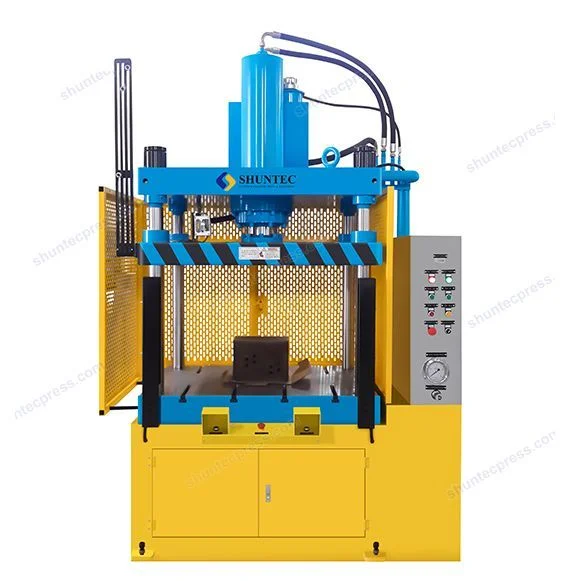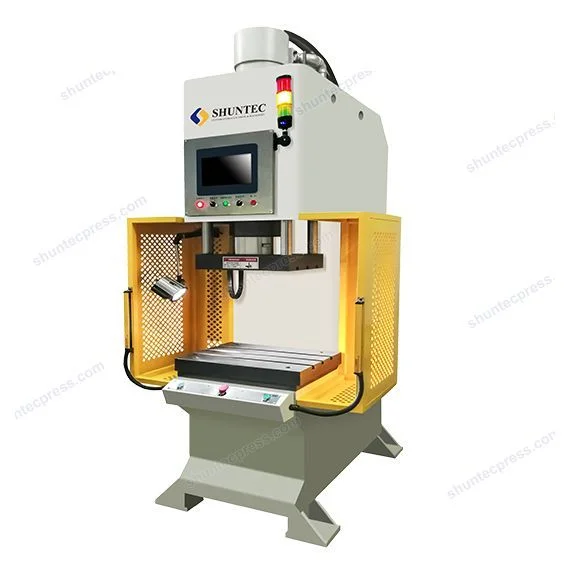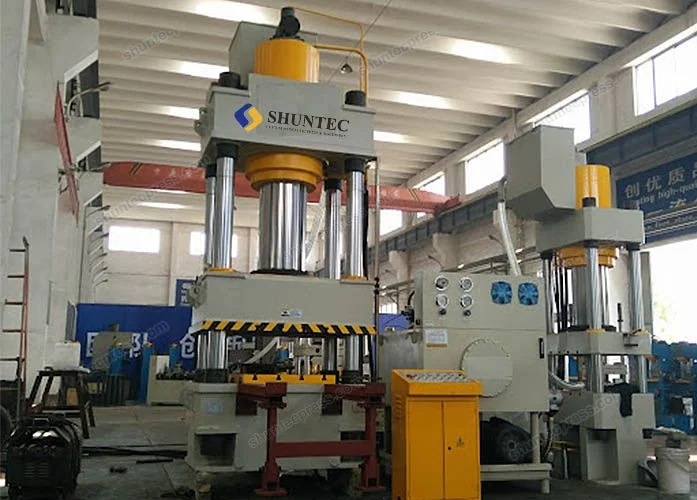Introduction
Choosing the right industrial machinery, particularly a four-column hydraulic press, is an essential decision that requires a deep understanding of the machine and careful consideration. The hydraulic press you select can significantly influence your production efficiency, product quality, and overall operational success. Therefore, this guide aims to equip you with the necessary knowledge to make an informed decision tailored to your specific industrial needs.



Understanding Hydraulic Presses
A hydraulic press is a machine that uses a hydraulic cylinder to generate a compressive force. It operates based on Pascal’s principle, where pressure applied at any point within a fluid is transmitted undiminished in all directions. By using a relatively small force to initiate the pressure at one end, the hydraulic press can exert a much larger force at the other end, effectively amplifying the initial input.
Hydraulic presses have a wide range of applications across various industries such as manufacturing, where they play a pivotal role in forming, blanking, punching, deep drawing, and metal forming operations. They are also used in the automotive industry for tasks such as stamping car parts, in the electrical industry for assembling electrical parts, and in the packaging industry for molding and compacting materials.
There are several types of hydraulic presses, each with its unique design and suited for specific applications. These include the C-frame press, known for its accessibility and compact design; the H-frame press, renowned for its strength and versatility; and the four-column press, recognized for its precision and stability. This guide will focus on the four-column hydraulic press, offering detailed insights into its operation, benefits, and purchasing considerations.
Why a Four-Column Hydraulic Press?
The four-column hydraulic press is a versatile piece of equipment designed to offer numerous benefits across various applications. Its distinctive four-column structure ensures uniform distribution of force across the work surface, leading to excellent precision and alignment during operation. This results in high-quality output, making it an ideal choice for industries that require precise and consistent production, such as aerospace, automotive, and electronics manufacturing.
The four-column design is inherently stable and robust, capable of handling heavy loads without excessive deflection. The structure’s rigidity minimizes the risk of lateral movement during operation, reducing wear and tear on the machine’s components, and extending the overall lifespan of the equipment. Furthermore, the balanced load distribution prevents overloading on any single column, enhancing the safety and durability of the machine.
Another advantage of four-column hydraulic presses is their adjustable pressure settings. The hydraulic system allows for precise control of the force exerted, which is particularly beneficial for tasks that require varying pressure levels. This feature, coupled with the press’s high degree of accuracy and repeatability, makes the four-column hydraulic press a valuable tool for a wide range of industrial applications.
Key Features to Consider When Purchasing a Four-Column Hydraulic Press
When purchasing a four-column hydraulic press, it’s essential to understand the key features that can significantly impact the machine’s performance and suitability for your tasks:
Pressure Capacity
The pressure capacity of a hydraulic press refers to the maximum force that the press can generate. It’s typically measured in tons or kilonewtons. The right pressure capacity for your operations will depend on the type of work you’re performing. Light-duty tasks such as bending or forming thin metal sheets may require a lower capacity, while heavy-duty tasks like forging or molding robust materials may require a higher capacity. Overloading a press by operating it beyond its pressure capacity can lead to inefficiencies, damage, and premature wear and tear.
Stroke Length
Stroke length is another critical feature to consider. It refers to the maximum distance that the press’s ram (the part that applies the force) can travel. This determines how thick a workpiece the press can handle and how deep a draw or bend it can make. If your operations involve deep drawing or forming large parts, you’ll need a press with a longer stroke length. Conversely, if your tasks involve shallow drawing or small parts, a shorter stroke length may suffice.
Speed
The speed of a hydraulic press is an important factor that can influence your production efficiency. It’s usually measured in inches or millimeters per minute, and it’s essential to consider both the approach speed (the speed at which the ram descends towards the workpiece without load) and the pressing speed (the speed at which the ram exerts force on the workpiece). A faster approach speed can reduce the cycle time, increasing your productivity. However, the pressing speed often needs to be slower to ensure precision and control. Balancing these two aspects is key to optimizing your operations.
Bed Size
The bed size of a hydraulic press is the area where the workpiece is placed. It needs to be large enough to accommodate your workpieces comfortably. If your workpieces are large or you need to work on multiple pieces simultaneously, you’ll need a press with a larger bed size. However, keep in mind that a larger bed size may also require more space in your workshop.
Automation Features
Technological advancements have introduced a variety of automation features to modern hydraulic presses. These features can enhance your productivity, precision, and safety. Programmable logic controllers (PLCs) allow for precise control of the press’s operations, including pressure, speed, and stroke length. Touch screen interfaces provide an intuitive platform for operators to monitor and control the press’s operations. Safety features like light curtains can detect the presence of operators or foreign objects in the press’s path, automatically stopping the machine to prevent accidents.

How to Choose a Reliable Hydraulic Press Manufacturer in China
Selecting a reliable hydraulic press manufacturer is a crucial step in your purchasing journey. Here are some key criteria to consider:
Experience
Manufacturers with years or decades of experience in the industry are often more reliable. They have had the time to refine their designs, improve their manufacturing processes, and build a reputation for quality. They are also more likely to understand the unique challenges and requirements of different industries, enabling them to provide valuable advice and tailored solutions.
Quality Assurance
Quality assurance is an essential factor in selecting a manufacturer. Manufacturers who hold international quality certifications, such as ISO 9001, demonstrate a commitment to quality and continuous improvement. These certifications indicate that the manufacturer adheres to recognized industry standards in their production processes, which can give you confidence in the quality and reliability of their machines.
After-Sales Service
The relationship with your manufacturer shouldn’t end once the sale is completed. Good manufacturers provide excellent after-sales service, including parts availability, maintenance services, and technical support. This ensures that you can keep your machine running smoothly and efficiently even after the purchase. It can also give you peace of mind, knowing that assistance is available if any issues arise.
Customization Options
Depending on your specific needs, you may require customization options. Some manufacturers offer customized solutions, including custom pressure capacities, stroke lengths, bed sizes, or automation features. These options can help you get a machine that perfectly fits your operational requirements.
As a leading hydraulic press manufacturer in China, our company prides itself on meeting these criteria. We have accumulated years of experience in the industry, consistently delivering high-quality, reliable machines. Our four-column hydraulic presses are designed with the user’s needs in mind, offering a perfect blend of performance, durability, and safety.
The Importance of Safety and Maintenance
Safety should always be a top priority when operating any heavy machinery, including a four-column hydraulic press. Modern presses should come equipped with safety features designed to protect the operator and prevent accidents. These include overload protection, which prevents the machine from operating beyond its capacity; safety guards or light curtains, which can detect the presence of operators or foreign objects in the press’s path and automatically stop the machine; and emergency stop buttons, which can quickly halt the machine’s operations in case of an emergency.
Proper maintenance of your hydraulic press is also crucial. Regular maintenance helps ensure the machine’s longevity and efficient operation. It involves inspecting the machine’s components for signs of wear or damage, lubricating moving parts to reduce friction and wear, checking hydraulic fluid levels to ensure smooth operation, and maintaining proper alignment to ensure precision. Following the manufacturer’s recommended maintenance schedule and procedures can prevent unexpected breakdowns and costly repairs.
Financing Options and Pricing
The cost of a four-column hydraulic press can vary widely depending on its specifications, features, and the manufacturer. In China, prices can range from tens of thousands to hundreds of thousands of yuan, depending on the machine’s capacity, sophistication, and additional features. While the initial cost is a significant factor, it’s also important to consider the machine’s quality, reliability, and after-sales service, as these can impact the total cost of ownership.
To make the purchase more affordable, some manufacturers, including us, offer financing options. These can range from installment payments, which allow you to spread the cost over a period of time, to leasing options, which allow you to use the equipment for a fixed period without having to buy it outright. These options can help you acquire the equipment you need without a substantial upfront payment, reducing the financial burden and improving your cash flow.
Conclusion
Investing in the right four-column hydraulic press is a decision that can significantly impact your business operations. By understanding the key features of these machines, the importance of choosing a reliable manufacturer, and the need for safety and regular maintenance, you can make an informed decision that best suits your industrial needs. Always remember that the right hydraulic press is not just about performance and features, but also about suitability for your specific operations, long-term reliability, and overall value.
Contact Information
If you need more information or have any questions about our four-column hydraulic presses, please don’t hesitate to reach out to us. Our team of professionals is ready to provide expert advice and help you choose the perfect machine for your operations.
